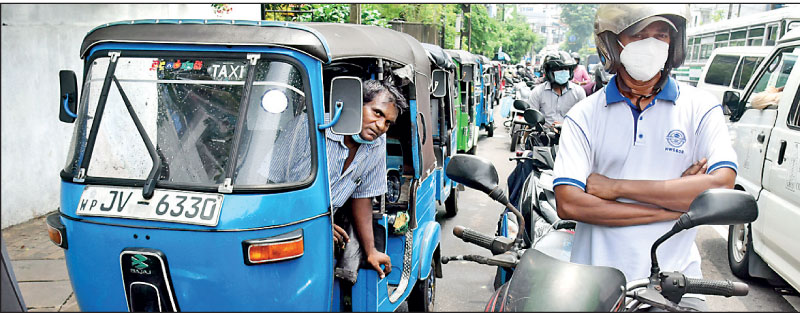Why not ask dumb questions

Thursday, 2 June 2022
 We stay in a queue to prove that “I came before you”. Queues are there because there is a supply shortage. Almost 20 years ago this was the situation at private hospitals. To get an appointment from well-known doctors one had to stay in the queue from very early in the morning. Then came echanneling.com, and the rest is history.
We stay in a queue to prove that “I came before you”. Queues are there because there is a supply shortage. Almost 20 years ago this was the situation at private hospitals. To get an appointment from well-known doctors one had to stay in the queue from very early in the morning. Then came echanneling.com, and the rest is history.
Just imagine applying the same platform. Equate a petrol shed to a hospital, fuel pump to a doctor and register with your phone number and book a fuel pump based on the availability of stock. The shed can allocate about 80-90% for this and balance for any drive-in clients. Then there will be no waiting for hours and days in petrol ques.
Until we bring some stability to our forex issue we will have to bring some rationalisation of usage of fuel. We must prioritise as to who should be given fuel first based on usage. Experts can come up with a scoring system to determine how much each category user can receive for a given period. Public transport, health and essential services, agriculture, commercial transport, private transport, and by the engine capacity of the vehicle such rationalisation can be implemented.
When it comes to kerosene oil, which is subsidised, has a domestic application as well as legal as well as illegal commercial applications. By implementing a system like this such illegal usage can be restricted and differentiated pricing can be applied by providing the subsidy only to those who deserve it, like the urban and plantation poor who use kerosene oil for cooking.
Even if we have to use such a system for a few years that will bring the required equitable use of limited resources and give away the archaic system of waiting in queues for long hours.
Even if 80% of vehicle owners register, this app will have a massive database that can be an excellent platform in app sales and marcom strategies. Thus, this can be a commercially viable proposition even for a social innovator.
We need disruptive thinking to find solutions to the current cooking energy problem, without taking it as an LPG problem – Pix by Ruwan Walpola
|
Community kitchen
The hardest hit from the shortage of domestic gas are the urban people who live in small homes and in mid and low income apartments where they have very little alternative options.
For such communities we should facilitate through municipal councils, temples, churches or such welfare organisations a system of community cooking.
What is suggested is that community kitchens are set up at a location close to a community in a permanent or a temporary building where a number of large 35-litre industrial gas cylinders are connected to a series of cookers. Those cookers can be fixed with meters so the usage can be monitored. The residents will have to bring ready to cook food items and use the cookers and pay for usage. Well one can say this is not practical, but far better than having to sleep overnight at gas queues.
Once we start such a facility there might emerge new businesses such as cut and prepared vegetables for people to buy. Some will have scraped coconut, etc. There can even be utensils to hire. And this can eventually be a wonderful community experience. It will certainly be economical for the consumer as one would pay only for the gas used. This will in the medium term reduce the burden on the system. Otherwise currently there must be a couple of ship loads of gas in households.
Alternative stoves
We see a few efforts by local inventors who have come up with stoves that work on coconut charcoal and firewood. But I am not sure whether they can directly compete with the gas cookers. We need to come up with an alternative solution that does not use LP Gas or electricity in cooking, that is clean, and the temperature can be controlled. Development of such a product needs different fields of science working together. This can be a massive marketing opportunity.
Just to stimulate thought let me share a case study.
Chotukool
(https://www.youtube.com/watch?v=IUADltOgj3w)
Godrej India used disruptive innovation concepts when their sales of refrigerators was not growing. They set out first to make a small fridge for low income households. But the market surveys reveal that those people could not afford traditional fridges even though they are small. Above all most of them did not have a reliable supply of electricity. Their requirement was to preserve vegetables for a few days.
So the company defined the problem as “finding a solution to keep the vegetables fresh for a few days without having to depend on regular power supply and that is affordable to poor”.
In that process they replaced the conventional compressor of a fridge with a 4mmx4mm chip that managed the temperature and a rechargeable battery that can power the equipment. It was a small box that was similar to a cool box in a car. It revolutionised the market.
We need such disruptive thinking to find solutions to the current cooking energy problem, without taking it as an LPG problem.
Cooking is such an essential activity of our existence, and how come we have to depend on a ship from some other country to boil my vegetables! What kind of food security is that? Now is the time to ask such dumb questions.

%20(1)%20(3)%20(1)%20(1).png)

No comments:
Post a Comment
Note: only a member of this blog may post a comment.